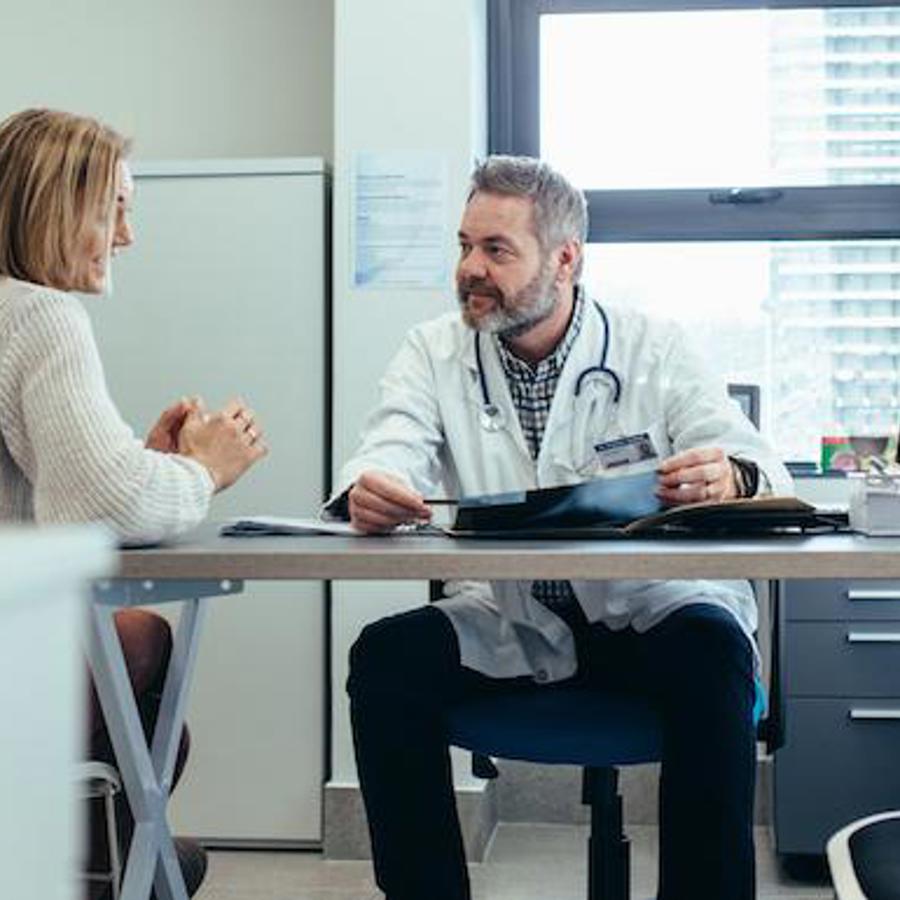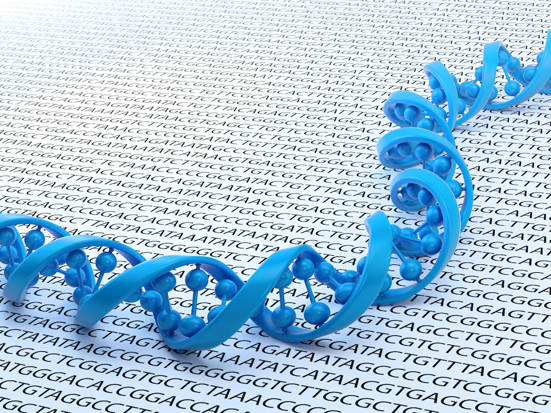
When will doctors be able to use your genome to treat your illnesses?
September 22, 2006

- Related Topics:
- Personalized medicine,
- Genetic testing,
- Futuristic science,
- Medical genetics
A curious adult from California asks:
"When will doctors automatically map your genetic profile so that your treatment of illnesses can be more accurate and the prevention of serious disease will be accelerated?"
It'll be a long time before doctors will completely map your genetic profile. This is because how our DNA works is incredibly complicated. So complicated that we actually understand very little about it so far.
Added to this is the fact that DNA often isn't enough to cause an illness on its own. Unknown things in the environment are often needed to trigger the disease. Given both of these issues, it may be that we never get a complete picture of our future risks from our DNA.
But how close could we get? To start answering this, let's look at where we are right now.
Current genetic tests
We already have many tests to examine our genes. Some of these tell us if we are at a higher risk for developing an illness. Some tell us which medicines will work best for a particular person.
One type of testing is carrier testing. This test examines people with a family history of a disease to see if he or she will pass the disease on to his or her children.
There are many of these types of tests. One test looks for Tay Sachs disease, which affects a person's central nervous system. Another kind of carrier test looks for cystic fibrosis, which is a lung disease.
These kinds of tests are useful in predicting the risks that our children will have for certain diseases. But we already have some tests that can try to tell us if we may develop a disease as well.

BRCA mutations and cancer
One of these tests can help determine someone's risk for developing breast cancer. Around 5-10% of breast cancers are a hereditary form caused by changes in two genes, BRCA1 and BRCA2.1
There are certain versions of these genes that we can test for that lead to a higher risk of getting breast cancer. How do these versions increase our risk?
Let's look at BRCA1. Like most genes, BRCA1 is a piece of DNA that tells a cell to make a protein. BRCA1 tells cells to make a protein that fixes our DNA when it gets damaged.
This is important because our DNA is getting damaged all the time. Chemicals, sunshine or mistakes our own bodies make are causing changes in our DNA as we speak.
Most of these mistakes are no big deal, but some can be devastating and cause problems like cancer. The BRCA1 protein helps repair the damage and keep cancer from happening.
Some people have versions of BRCA1 that don't work right and end up making faulty protein. This protein can't repair DNA damage as well so there is an increased risk for cancer. This gene defect can be passed along in families.
We can now look at people's DNA and find out if they have the faulty gene or not. If they do, we can tell them they are at an increased risk for getting breast cancer.
Notice I said increased risk. It is not a sure thing. This is true of many DNA tests and makes the results hard to predict absolutely.
At least with BRCA1 there is something you can do. If you tested positive for this gene, you might have more frequent medical exams so that possible cancer could be detected early. Your doctor may even recommend some preventative treatment. Some may suggest lifestyle changes, too.
APOE4 mutations and Alzheimer’s
But for many DNA tests, knowing the results doesn't help because there is no cure. Take APOE4 as an example. People with certain changes in this DNA are at an increased risk for developing Alzheimer's.2
If you have this DNA change, there isn't much you can do. There is no preventative measure you can take to decrease your risk. You just know you are at an increased risk for an incurable disease.
Most genetic tests are at this stage right now. We have the capability to tell you that you are at an increased risk but can't actually help you.
Of course, this will presumably change as we learn more. At some point in the future, we will know what to do with more of these DNA changes.

Testing the entire genome
The DNA tests we currently perform require lots of detail and analysis. How in the world would you look at all 25,000 of our genes? And the other 98% of our DNA that isn't genes?
Maybe by using something called DNA microarrays. DNA microarrays are a fancy way to do thousands of genetic tests on a single glass slide.
One of these tests, called the Amplichip, is currently being used by doctors. This test looks at many genes at one time and helps us figure out what enzymes a person uses to process drugs.
Knowing this can help the doctor select the best drug for a person, and give them the amount that will work best. It may also help decrease side effects because it tells us what genes a person uses to process many kinds of drugs. In the future, these tests may be more useful than predictive gene testing.
So let's say we have someone's entire DNA sequence. Or an elaborate set of genetic tests set up as an array. Could we predict future illness effectively?
Not for a long time. Maybe not ever. We still don't know what most of our genes do. And we know even less about what the DNA between the genes does.
Diseases and the environment
Even if we were to figure this out in some distant future, we still won't be able to predict for sure that someone will get sick. Why not? Because many common diseases like diabetes or heart disease are caused by the interaction of our genes with the environment. And we don't know what things in the environment trigger these disease genes. And there are probably different triggers for different sets of genes. There are many, many paths to these diseases, each of which will need to be worked out.
All of this requires a deep understanding of our DNA and how it works and interacts with the environment which we do not possess. And may never possess.
In the future, we'll probably be able to map out more about people's genes, and detect more illnesses early in people. We'll be able to help them early, if help for that illness is available.
But, we may end up being able to test people for illnesses they may have, but for which we have no treatment, nor help. Just like today, we'll have to use these tests pretty carefully.
Some people think that we may get too much information about people if we are able to map out their entire profiles. And in the end, all we'll still know is how things may turn out, not how they will turn out. Not everyone wants to know if they are at higher risk for all kinds of diseases. Would you?

Author: Dr. Devasena Gnanashanmugam
When this answer was published in 2006, Devasena was a postdoctoral fellow in the Department of Pediatric Infectious Diseases, studying the oral polio vaccine in Yvonne Maldonado’s laboratory. Devasena wrote this answer while participating in the Stanford at The Tech program.
 Skip Navigation
Skip Navigation
